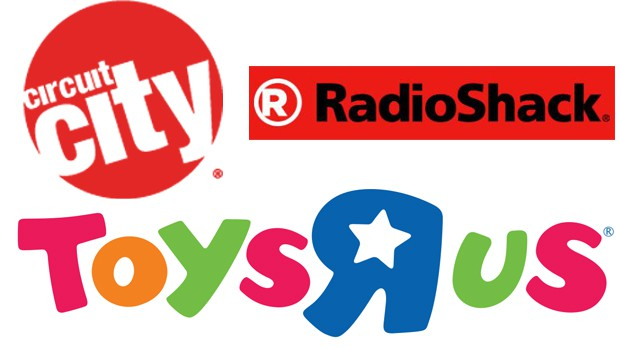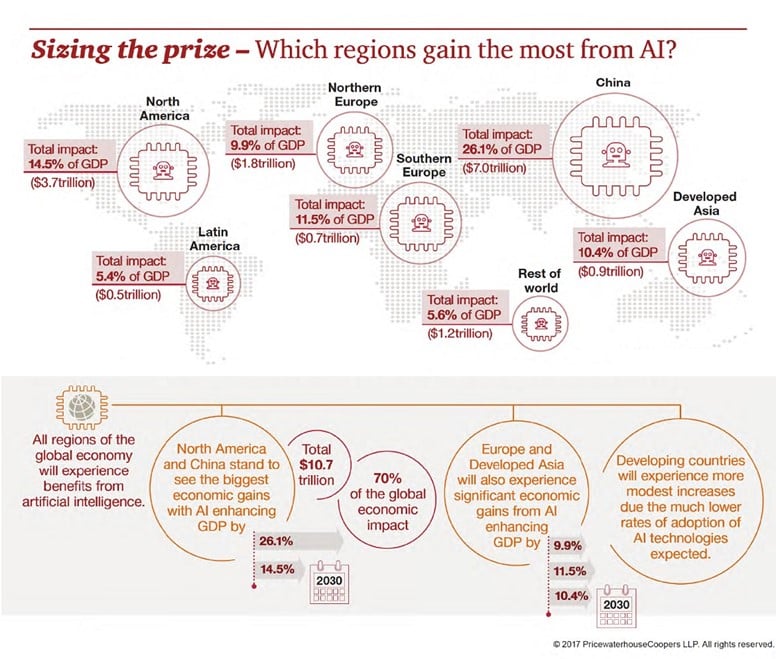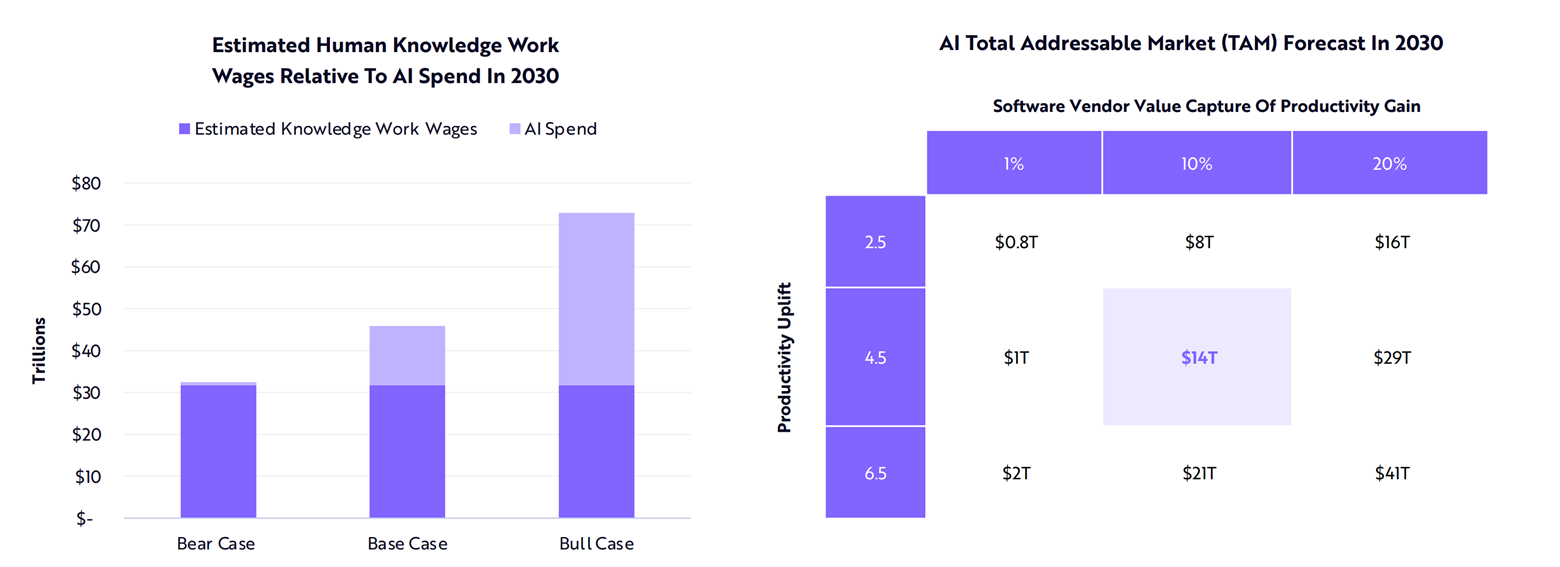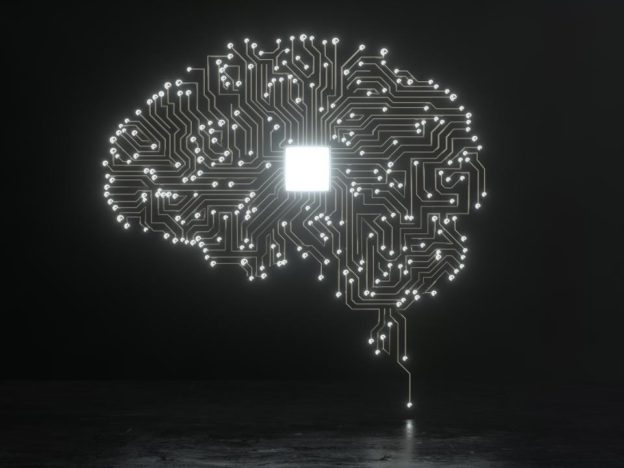- The AI economy is going to have a global impact that will be almost as large as the entire US economy, with PwC and ARK Invest predicting that the AI market will be worth $15.7 trillion to $40 trillion by 2030.
- Similar to how the emergence of the internet reshaped the global economy in the 2010s, AI technologies will transform every aspect of the economy over the next decade, with industries such as retail, streaming, and social media being redefined by AI applications.
- Companies such as Alphabet, Tesla, and Microsoft are racing towards AI supremacy because the stakes are high – if they don’t create the best AI-powered platforms in their respective industries, they risk being left behind in the age of AI. The potential rewards for embracing AI, however, are enormous.
There has been a lot of talk and hype about artificial intelligence recently, thanks mostly to the hugely successful launch of the conversational chatbot ChatGPT.
But is all the hype worth it? Will the so-called AI Economy even be that big?
In short, yes, and its global impact will be enormous – nearly as large as (or larger than) the entire U.S. economy.
Sounds hyperbolic. It’s not.
The next decade will be defined by the emergence of AI technologies reshaping every facet of our global economy.
Again, sounds hyperbolic. But it’s not. We’ve actually seen this rodeo before.
In the 2010s, every facet of our global economy was reshaped by the emergence of internet technologies.
In the 2010s, retail stores became e-commerce sites. Now, in the 2020s, e-commerce sites will become AI shopping apps, with machine learning algorithms powering product recommendations and pricing dynamics.
In the 2010s, video rental and music record stores became streaming platforms. Now, in the 2020s, streaming platforms will become AI streaming apps, with ML algos powering movie and TV show recommendations.
In the 2010s, networking parties and social outings became social media apps. Now, in the 2020s, social media apps will become AI social media apps, with every feed, post, comment, video, and friend recommendation delivered to you in a hyper personalized fashion by AI.
Even things like energy infrastructure, electric vehicles, and drug discovery will be propelled forward by AI, with AI algos used to optimize energy usage and storage on the grid, create more efficient batteries through endless chemistry simulations, and diagnose and treat diseases more efficiently through novel techniques like genetic mapping.
AI will change everything over the next decade.
Much like the internet, it will mean fortunes and empires for some folks – and broken dreams and empty bank accounts for others because AI presents the potential for job displacement. (Ed’s note: It’s worth noting that privacy concerns and bias in algorithmic decision-making could hinder the widespread adoption of AI and limit its economic potential.)
The internet gave birth to Amazon (AMZN), Alphabet (GOOG, GOOGL), Microsoft (MSFT), and Apple (AAPL). It also laid waste to Sears, JCPenney, RadioShack, Blockbuster, and Polaroid – each of which were, in their heyday, considered titans of corporate America.
 The Age of AI will do the same. It will create new multi-trillion-dollar empires, and destroy seemingly indestructible empires.
The Age of AI will do the same. It will create new multi-trillion-dollar empires, and destroy seemingly indestructible empires.
But it will do so on a scale greater than any we’ve ever seen.
According to the World Economic Forum, the global digital economy measured about $14.5 trillion in 2022.
That’s huge. But it is nothing compared to the size of what the AI Economy will be one day.
According to PwC, the AI Economy will grow to $15.7 trillion by 2030 alone. That’s just 8 years away.
 The folks over at ARK Invest agree with PwC in thinking that the AI market will most likely be worth around $15 trillion by 2030.
The folks over at ARK Invest agree with PwC in thinking that the AI market will most likely be worth around $15 trillion by 2030.
But they also see a bull-case scenario for the market growing to $40 trillion by 2030, and further think that at 100% adoption, the global AI market could drive global labor productivity to about $200 trillion!
For reference, the entire U.S. economy is worth just over $20 trillion, so there are pathways for the AI Economy to one day be significantly more valuable than the entire U.S. economy.
 This is the biggest and most important technological revolution of our lifetimes, with the biggest economic stakes of any paradigm shift we’ve ever witnessed.
This is the biggest and most important technological revolution of our lifetimes, with the biggest economic stakes of any paradigm shift we’ve ever witnessed.
Why else do you think Microsoft, Alphabet, Tesla (TSLA), and others are racing toward AI supremacy?
All of those companies were pretty quiet about AI for years, until OpenAI unveiled ChatGPT in late November.
Within months, Alphabet launched a ChatGPT competitor and Tesla started calling itself the biggest AI company in the world.
Coincidence? No.
These tech giants know that everything is at stake in the emerging Age of AI.
If Alphabet doesn’t create the best AI-powered search platform, it won’t be the world’s most used search engine in 10 years.
If Amazon doesn’t create the best AI-powered e-commerce platform, it won’t be the world’s largest retailer in 10 years.
The stakes are high. So are the potential rewards.
And that’s why we aren’t running away from the Age of AI – we’re embracing it.
The first step in embracing something is understanding it. That’s why, this Thursday afternoon at 4 p.m. Eastern, I am going to host InvestorPlace’s first-ever AI Super Summit conference.
In that presentation, I am going to discuss what AI is, how it works, what drives it, and why it’s only going to get better from here. I’m also going to discuss how AI will change the world, what specific industries it is going to have the biggest impact on over the next 12 months, and of course, which AI stocks are the best ones to buy right now.
Trust me. If there is one presentation you don’t want to miss this year, this is it.
This is the presentation that could give you a sneak-peak into the future of our economy – a presentation that could tell you how to capitalize on an economic opportunity bigger than the entire U.S. economy.
Reserve your seat for a peek into an opportunity bigger than the entire U.S. economy.
https://investorplace.com/hypergrowthinvesting/2023/02/this-stock-indicator-calls-huge-rallies-with-100-success-2/





